

Secret Intelligence Service. MI5. British domestic intelligence agency Within the civil service community, the service is colloquially known as Box,[4] or Box 500,[5] after its official wartime address of PO Box 500; its current address is PO Box 3255, London SW1P 1AE.[6] Organisation[edit] The Security Service comes under the authority of the Home Secretary within the Cabinet.[7] The service is headed by a Director General (DG) at the grade of a Permanent Secretary of the Civil Service, who is directly supported by an internal security organisation, secretariat, legal advisory branch, and information services branch.
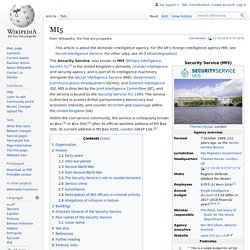
The Deputy Director General is responsible for the operational activity of the service, being responsible for four branches; international counter-terrorism, National Security Advice Centre (counter proliferation and counter espionage), Irish and domestic counter-terrorism, and technical and surveillance operations.[8] History[edit] Early years[edit] Inter-war period[edit] Second World War[edit] Hidden Agendas: Our Intelligence Services. This grand edifice is to be the new home of Australia’s premier spy agency, the Australian Security Intelligence Organisation (ASIO).

Costed at a staggering $585 million, the building has been called a “monster” by the architect of Parliament House. Yet it’s a fitting abode for an organisation that has grown over the past decade into one of the most powerful government bodies in the land – its staff numbers trebled, its budget increased more than sixfold to $438 million per year. Distinguished Speaker Series: ASIS At 60 - Nick Warner. The Lowy Institute for International Policy invites you to attend the first ever public address by a Director-General of the Australian Secret Intelligence Service (ASIS) in the organisation’s 60-year history, on Thursday, 19 July in Canberra.
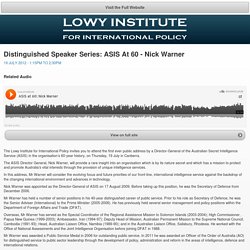
The ASIS Director General, Nick Warner, will provide a rare insight into an organisation which is by its nature secret and which has a mission to protect and promote Australia's vital interests through the provision of unique intelligence services. In this address, Mr Warner will consider the evolving focus and future priorities of our front-line, international intelligence service against the backdrop of the changing international environment and advances in technology. Nick Warner was appointed as the Director-General of ASIS on 17 August 2009. Before taking up this position, he was the Secretary of Defence from December 2006. Mr Warner has held a number of senior positions in his 40-year distinguished career of public service.
Australian Secret Intelligence Service (ASIS) Introduction.
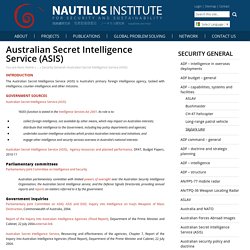
National Security Committee australia. Technology police. Special Activities Division. Seal of the Central Intelligence Agency The Special Activities Division (SAD) is a division in the United States Central Intelligence Agency's (CIA) National Clandestine Service (NCS) responsible for covert operations known as "special activities".
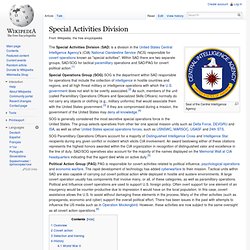
Within SAD there are two separate groups, SAD/SOG for tactical paramilitary operations and SAD/PAG for covert political action.[1] SOG Paramilitary Operations Officers account for a majority of Distinguished Intelligence Cross and Intelligence Star recipients during any given conflict or incident which elicits CIA involvement. Secret Intelligence Service. It is frequently referred to by the name MI6 (Military Intelligence, Section 6), a name used as a flag of convenience during the First World War when it was known by many names.[2] The existence of MI6 was not officially acknowledged until 1994.[3]
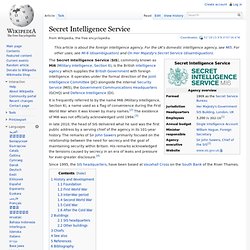
Shin Bet. Sherut haBitaẖon haKlali (Hebrew: שירות הביטחון הכללי, General Security Service), better known by the acronym Shabak (Hebrew: שב״כ, IPA: [ʃaˈbak] ( Organization[edit] Shabak is believed to have three operational wings:[2] The Arab Affairs Department: responsible primarily for Arab related counter-terrorism activities in both Israel and the Palestinian Territories.The Non Arab Affairs Department: responsible for non-Arab security issues and cooperation with foreign security agencies, previously concerned with the Communist Bloc.The Protective Security Department: responsible for protecting high-value individuals and locations in the country such as government officials, embassies, airports, and research facilities.
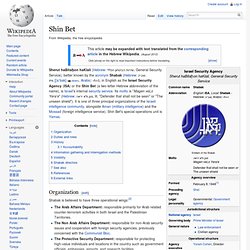
Although a security agency, it is not a part of the Israeli Ministry of Defense, and its chief answers directly to the Prime Minister of Israel. Central Intelligence Agency. The entrance of the CIA New Headquarters Building (NHB) of the George Bush Center for Intelligence.
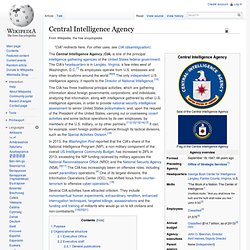
The Central Intelligence Agency (CIA) is one of the principal intelligence-gathering agencies of the United States federal government. The CIA's headquarters is in Langley, Virginia, a few miles west of Washington, D.C.[7] Its employees operate from U.S. embassies and many other locations around the world.[8][9] The only independent U.S. intelligence agency, it reports to the Director of National Intelligence.[10] Several CIA activities have attracted criticism. They include nonconsentual human experiments, extraordinary rendition, enhanced interrogation techniques, targeted killings, assassinations and the funding and training of militants who would go on to kill civilians and non-combatants.[19][20][21] Purpose According to its fiscal 2013 budget, the CIA has five priorities:[4] Organizational structure Executive Office Executive staff General publications General Counsel and Inspector General.
National Security Agency. The National Security Agency (NSA) is a U.S. intelligence agency responsible for providing the United States government with encrypted communications (information assurance) and the reading of encrypted communications (signals intelligence) of other nations.
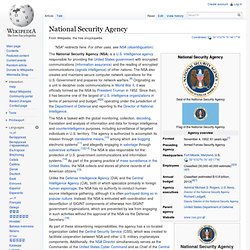
The NSA also creates and maintains secure computer network operations for the U.S. Government and prepares for network warfare.[8] Originating as a unit to decipher code communications in World War II, it was officially formed as the NSA by President Truman in 1952. Since then, it has become one of the largest of U.S. intelligence organizations in terms of personnel and budget,[6][9] operating under the jurisdiction of the Department of Defense and reporting to the Director of National Intelligence. The NSA has been a matter of political controversy on several occasions in its short history. Secret Intelligence Service.